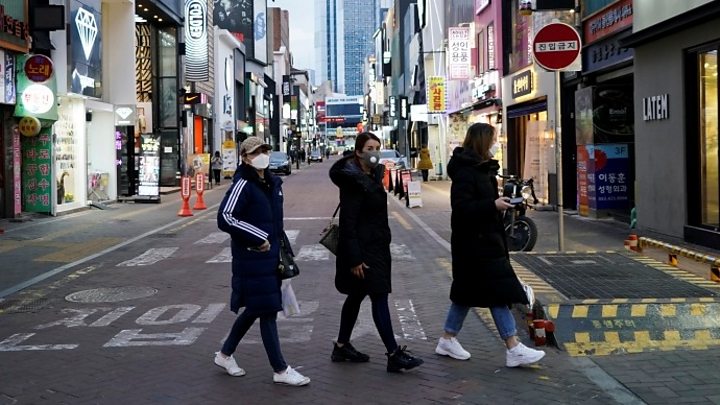Image copyright
AFP
The South Korean city of Daegu has seen the biggest increase in infections
South Korea has raised its coronavirus alert to the “highest level” as confirmed case numbers keep rising.
President Moon Jae-in said the country faced “a grave turning point”, and the next few days would be crucial in the battle to contain the outbreak.
Five people have died from the virus in South Korea and more than 600 have been infected.
Meanwhile, Italy and Iran have announced steps to try to contain worrying outbreaks of the virus.
In Italy, strict quarantine restrictions are in force in two northern “hotspot” regions close to Milan and Venice.
People cannot enter or leave several towns in Veneto and Lombardy for the next two weeks without special permission. Even outside the zone, many businesses and schools have suspended activities, and sporting events have been cancelled including several top-flight football matches.
Italy has seen two deaths and the number of confirmed cases has risen to more than 100 – 89 of them in Lombardy.
“The contagiousness of this virus is very strong and pretty virulent,” said Lombardy’s health chief, Giulio Gallera.
Iran’s outbreak of coronavirus has significantly worsened, with five deaths since Wednesday. The government has acknowledged 29 confirmed cases although officials have warned the virus may have spread to “all cities”.
Schools, universities and cultural centres across 14 Iranian provinces have been closed from Sunday.
The new strain of coronavirus, which originated last year in Hubei province in China, causes a respiratory disease called Covid-19.
What’s happening in South Korea?
On Sunday, health officials revealed a further leap in the number of coronavirus cases with a cluster of infections linked to a hospital and to a religious group near the south-eastern city of Daegu.
South Korea has seen the largest number of confirmed cases after China, where there have been more than 76,000 infections. An outbreak on the Diamond Princess cruise ship in Japan has also seen more than 600 cases.
“The Covid-19 incident faces a grave turning point,” President Moon said following a meeting with ministers and experts.
“The next few days will be crucial. The government will raise the alert level to the highest level of ‘grave’ according to experts’ recommendations and drastically strengthen our response system.”

Media playback is unsupported on your device
On Sunday, South Korea reported 169 new cases – 95 of them linked to a Christian sect in Daegu called the Shincheonji Church of Jesus. The total number of cases connected to the church stands at 329, the Korea Centers for Disease Control and Prevention (KCDC) said.
In a video statement, a church spokesman expressed “deep regret” that many of its followers and citizens of South Korea had been infected. The spokesman added that the church had advised about 250,000 members to minimise their outside contact and take precautions.
Daenam Hospital in nearby Cheongdo, which treats the elderly and people with mental health issues, has seen more than 110 people infected including nine medical staff.
In other developments:
- Israel refused to allow non-Israelis to disembark from a Korean Air plane at Ben-Gurion Airport on Saturday. It had announced a ban on South Koreans and Japanese visitors, sparking an official protest from Seoul
- China reported another 97 deaths on Sunday, taking its total to 2,442
- Dozens of evacuees from the Diamond Princess cruise ship have begun their two-week quarantine in the UK
What’s the wider situation?
The head of the World Health Organization (WHO), Dr Tedros Adhanom Ghebreyesus, has expressed concern at the number of new cases with no clear link to China or other confirmed cases.
In a briefing to the African Union on Saturday, he said the greatest concern now was countries with weaker health systems, particularly in Africa.
Dr Tedros said the WHO was working with African governments to train thousands of health workers and to provide equipment to identify and treat infected people.
“Our biggest concern continues to be the potential for Covid-19 to spread in countries with weaker health systems,” he said. “We are working hard to prepare countries in Africa for the potential arrival of the virus.”
Dr Tedros said some countries, such as the Democratic Republic of Congo, were using experience gained from testing for the Ebola virus to test for the new coronavirus.
“This is a great example of how investing in health systems can pay dividends for health security,” he added.
